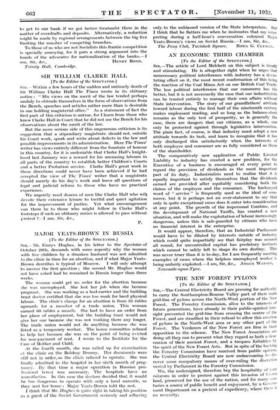AN ECONOMIC THIRD CHAMBER [To the Editor of the SPECTATOR.]
SIR,—The article of Lord Melchett on this subject is timely and stimulating. He is altogether right when he urges that unnecessary political interference with industry has a devas- tating effect on it, the most recent confirmation of this being the reaction of the Coal Mines Act on our British Coal Trade. The less political interference that our commerce has the better, but it is not necessarily the case that our industrialists can be trusted entirely to manage their own affairs without State intervention. The story of our grandfathers' attitude toward labour during the first half of the nineteenth century makes unpleasant reading, and so long as the balance-sheet remains as the only test of prosperity, as is generally the case, there are dangers that our citizens, as a whole, can only be protected against through legislative intervention. The plain fact, of course, is that industry must adopt a new attitude towards its task, and learn to recognize thit it has only discharged this satisfactorily when the interests of both employee and consumer are as fully considered as those of the shareholder.
The comparatively new application of Public Limited Liability to industry has created a new problem, for the Executive of a business is encouraged at every point to regard the provision of dividends as the most important part of its duty. Industrialists need to realize that it is equally important to satisfy themselves that the dividends earned are provided after equitably considering both the claims of the employee and the consumer. The hackneyed word of " service " is frequently used as the ideal of com- merce, but it is perhaps not an over-statement to say that only in quite exceptional cases does it enter into consideration at any point. The growth of the impersonal Combine, and the development of National Tariffs, has created a new situation, and will make the exploitation of labour increasingly dangerous, unless this is safe-guarded by citizens who have no financial interest in the enterprise.
It would appear, therefore, that an Industrial Parliament
would have to be diluted by interests outside of industry which could quite impartially see that fairplay was secured all round, for uncontrolled capital has predatory instincts which cannot be safely left to shape its own destiny. This was never truer than it is to-day, for I am frequently meeting examples 'of cases where the helpless unemployed worker is being unfairly exploited.—I am, Sir, &c., ANGUS WATSON.
Newcastle-upon-Tyne.






























 Previous page
Previous page